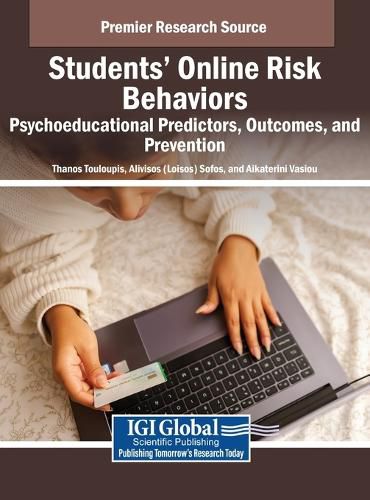Readings Newsletter
Become a Readings Member to make your shopping experience even easier.
Sign in or sign up for free!
You’re not far away from qualifying for FREE standard shipping within Australia
You’ve qualified for FREE standard shipping within Australia
The cart is loading…






This title is printed to order. This book may have been self-published. If so, we cannot guarantee the quality of the content. In the main most books will have gone through the editing process however some may not. We therefore suggest that you be aware of this before ordering this book. If in doubt check either the author or publisher’s details as we are unable to accept any returns unless they are faulty. Please contact us if you have any questions.
As students continue to engage in online environments for education, social interaction, and entertainment, understanding online risk behaviors becomes essential for promoting digital safety and well-being. Psychoeducational predictors, such as personality traits, mental health status, and digital literacy, play a significant role in shaping students' online activities and vulnerability to risks like cyberbullying, identity theft, and exposure to inappropriate content. The outcomes of these behaviors can have lasting effects on both academic performance and personal development. By identifying these predictors and understanding their impacts, educators, parents, and policymakers can develop targeted prevention strategies to give students the skills and knowledge to navigate the digital world. Students' Online Risk Behaviors: Psychoeducational Predictors, Outcomes, and Prevention explores the determinants and outcomes of online risk behaviors among school and university students to explain if and how different factors can influence or be influenced by students' online risk behaviors in different developmental periods. It also focuses on prevention programs and actions aimed to promote a safe online culture both in the school and university community. This book covers topics such as internet technology, online behavior, and risk management, and is a useful resource for educators, psychologists, computer engineers, scientists, academicians, and researchers.
$9.00 standard shipping within Australia
FREE standard shipping within Australia for orders over $100.00
Express & International shipping calculated at checkout
This title is printed to order. This book may have been self-published. If so, we cannot guarantee the quality of the content. In the main most books will have gone through the editing process however some may not. We therefore suggest that you be aware of this before ordering this book. If in doubt check either the author or publisher’s details as we are unable to accept any returns unless they are faulty. Please contact us if you have any questions.
As students continue to engage in online environments for education, social interaction, and entertainment, understanding online risk behaviors becomes essential for promoting digital safety and well-being. Psychoeducational predictors, such as personality traits, mental health status, and digital literacy, play a significant role in shaping students' online activities and vulnerability to risks like cyberbullying, identity theft, and exposure to inappropriate content. The outcomes of these behaviors can have lasting effects on both academic performance and personal development. By identifying these predictors and understanding their impacts, educators, parents, and policymakers can develop targeted prevention strategies to give students the skills and knowledge to navigate the digital world. Students' Online Risk Behaviors: Psychoeducational Predictors, Outcomes, and Prevention explores the determinants and outcomes of online risk behaviors among school and university students to explain if and how different factors can influence or be influenced by students' online risk behaviors in different developmental periods. It also focuses on prevention programs and actions aimed to promote a safe online culture both in the school and university community. This book covers topics such as internet technology, online behavior, and risk management, and is a useful resource for educators, psychologists, computer engineers, scientists, academicians, and researchers.